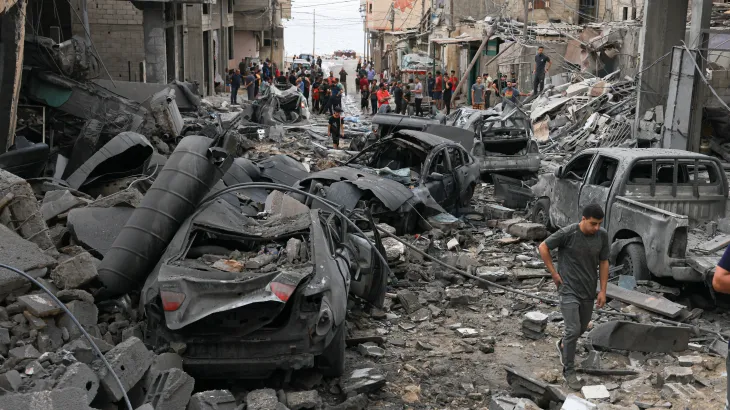Heavy Casualties in Gaza
Israel’s latest military assaults on Gaza have left more than 50 Palestinians dead and caused massive destruction to infrastructure and homes. According to reports from regional media, over 1,000 buildings were completely demolished in a series of coordinated strikes.
Israeli tanks carried out shelling in northern Gaza, while intense aerial bombardments struck the southern and central parts of the enclave. Analysts describe these actions as an effort to secure full control over Gaza, which has been under near-constant attack since the escalation of hostilities months ago.
Among the dead were 24 Palestinians waiting for humanitarian aid, highlighting the dire situation faced by civilians as shortages of food, water, and medicine deepen. In addition, eight people died of hunger and malnutrition, pushing the overall toll from food scarcity in Gaza to 289 deaths, including at least 115 children.
Mounting Humanitarian Toll
The latest figures underscore the devastating impact of the ongoing conflict. Since the start of the Israeli campaign, more than 62,600 Palestinians have been killed and over 157,000 injured, according to local health authorities. These numbers reflect not only direct casualties from bombings but also those succumbing to lack of medical care, food, and clean water.
Meanwhile, in the occupied West Bank, Israeli forces arrested 14 Palestinians during overnight raids in Ramallah. Human rights groups have repeatedly warned that arbitrary arrests are contributing to rising tensions in the territory.
Israeli Strikes in Yemen
The violence has not been confined to Gaza. In Yemen’s capital, Sanaa, Israeli airstrikes killed six people and injured 67 others. Witnesses reported that missiles struck near the presidential complex, targeting fuel depots, a power station, and a military compound.
The Israeli military claimed the attacks were a retaliation against missile launches by Yemen’s Houthi rebels, who two days earlier had reportedly attempted to strike Israeli territory. Israel said its defense systems intercepted those projectiles before they caused damage.
The airstrikes, however, have sparked fears of a broader regional escalation. Yemen, already embroiled in a nearly decade-long civil war, is struggling with one of the world’s worst humanitarian crises, where millions rely on food aid to survive.
Escalating Regional Concerns
Observers warn that the intensifying strikes on both Gaza and Yemen risk destabilizing the broader Middle East. The United Nations has repeatedly cautioned that indiscriminate attacks on civilian areas may amount to violations of international law.
European governments and humanitarian organizations have also faced growing pressure to take a stronger stance. Calls are mounting for immediate ceasefires, humanitarian corridors, and diplomatic intervention to prevent the conflict from spiraling further.
International Reactions
So far, global reactions have been mixed. Western nations, including the United States and key EU states, continue to emphasize Israel’s right to self-defense. At the same time, humanitarian agencies stress that the scale of civilian casualties and infrastructure damage demands urgent accountability.
Aid agencies warn that without swift action, Gaza faces a humanitarian collapse, while Yemen risks being drawn deeper into a conflict that could spread instability across the Red Sea and Gulf of Aden. In response to the crisis, Pakistan has sent its 19th aid shipment to Gaza amid the ongoing humanitarian emergency
Outlook
As Israeli operations expand, the civilian cost in Gaza and Yemen continues to mount. With tens of thousands already dead and essential services destroyed, the crises highlight the urgent need for international mediation and sustained humanitarian relief.
For now, civilians in both territories remain trapped in worsening conditions, paying the highest price in a conflict with no clear resolution in sight.















